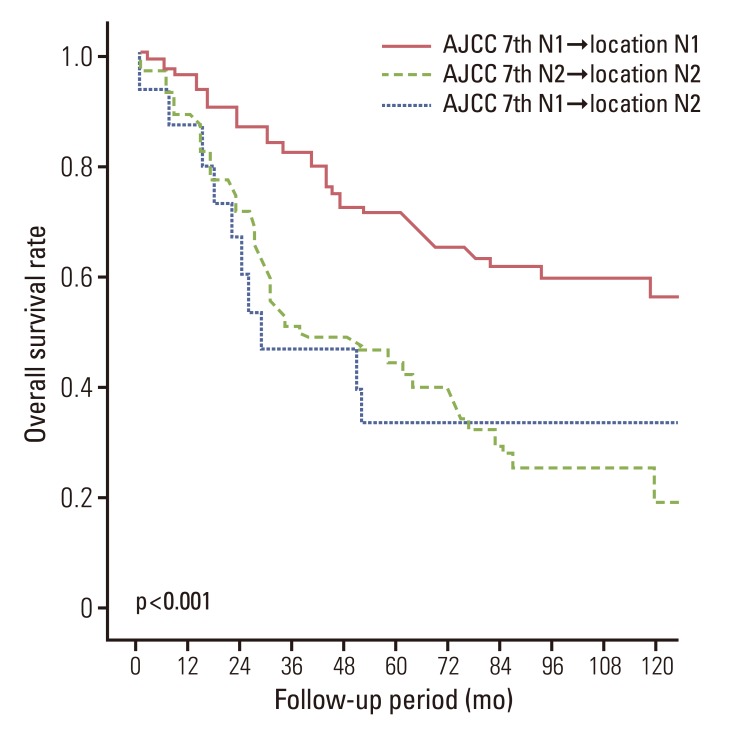Cancer Res Treat.
2014 Jan;46(1):41-47.
A Distribution Weighted Prognostic Scoring Model for Node Status in Advanced Rectal Cancer
- Affiliations
-
- 1Department of Surgery, Chonnam National University Medical School, Gwangju, Korea. cnuhcrs@gmail.com
- 2Trauma Center of Pusan National University Hospital, Busan, Korea.
Abstract
- PURPOSE
There are various lymph node-based staging systems. Nevertheless, there is debate over the use of parameters such as the number of involved lymph nodes and the lymph node ratio. As a possible option, the distribution of metastatic lymph nodes may have a prognostic significance in rectal cancer. This study is designed to evaluate the impact of distribution-weighted nodal staging on oncologic outcome in rectal cancer.
MATERIALS AND METHODS
From a prospectively maintained colorectal cancer database of our institution, a total of 435 patients who underwent a curative low anterior resection for mid and upper rectal cancer between 1995 and 2004 were enrolled. Patients were divided into 3 groups according to the location of apical metastatic nodes. A location-weighted prognostic score was calculated by a scoring model using a logistic regression test for location based-statistical weight to number of lymph nodes. All cases were categorized in quartiles from lymph node I to lymph node IV using this protocol.
RESULTS
The location of lymph node metastasis was an independent factor that was associated with a poor prognostic outcome (p<0.001). Based on this result, the location-weighted-nodal prognostic scoring model did not show lesser significant results (p<0.0001) in both overall survival and cancer-free survival analyses.
CONCLUSION
The location of apical nodes among the metastatic nodes does not have a lesser significant impact on oncologic result in patients with advanced rectal cancer. A location-weighted prognostic scoring model, which considered the numbers of involved lymph nodes as the rate of significance according to the location, may more precisely predict the survival outcome in patients with lymph node metastasis.
MeSH Terms
Figure
Reference
-
1. Sobin LH, Gospodarowicz MK, Wittekind C. TNM classification of malignant tumours. 7th ed. New York: Wiley-Blackwell;2009.2. Lee HY, Choi HJ, Park KJ, Shin JS, Kwon HC, Roh MS, et al. Prognostic significance of metastatic lymph node ratio in node-positive colon carcinoma. Ann Surg Oncol. 2007; 14:1712–1717. PMID: 17253102.
Article3. Huh JW, Kim YJ, Kim HR. Ratio of metastatic to resected lymph nodes as a prognostic factor in node-positive colorectal cancer. Ann Surg Oncol. 2010; 17:2640–2646. PMID: 20300967.
Article4. Chen SL, Steele SR, Eberhardt J, Zhu K, Bilchik A, Stojadinovic A. Lymph node ratio as a quality and prognostic indicator in stage III colon cancer. Ann Surg. 2011; 253:82–87. PMID: 21135690.
Article5. Kang J, Hur H, Min BS, Kim NK, Lee KY. Prognostic impact of inferior mesenteric artery lymph node metastasis in colorectal cancer. Ann Surg Oncol. 2011; 18:704–710. PMID: 20857225.
Article6. Leibold T, Shia J, Ruo L, Minsky BD, Akhurst T, Gollub MJ, et al. Prognostic implications of the distribution of lymph node metastases in rectal cancer after neoadjuvant chemoradiotherapy. J Clin Oncol. 2008; 26:2106–2111. PMID: 18362367.
Article7. Adachi Y, Inomata M, Miyazaki N, Sato K, Shiraishi N, Kitano S. Distribution of lymph node metastasis and level of inferior mesenteric artery ligation in colorectal cancer. J Clin Gastroenterol. 1998; 26:179–182. PMID: 9600365.
Article8. Alici A, Kement M, Gezen C, Akin T, Vural S, Okkabaz N, et al. Apical lymph nodes at the root of the inferior mesenteric artery in distal colorectal cancer: an analysis of the risk of tumor involvement and the impact of high ligation on anastomotic integrity. Tech Coloproctol. 2010; 14:1–8. PMID: 20066459.
Article9. Grinnell RS. The spread of carcinoma of the colon and rectum. Cancer. 1950; 3:641–652. PMID: 15427067.
Article10. Steup WH, Moriya Y, van de Velde CJ. Patterns of lymphatic spread in rectal cancer: a topographical analysis on lymph node metastases. Eur J Cancer. 2002; 38:911–918. PMID: 11978516.
Article11. Hermanek P, Altendorf A. Classification of colorectal carcinomas with regional lymphatic metastases. Pathol Res Pract. 1981; 173:1–11. PMID: 7335543.
Article12. Hojo K, Koyama Y, Moriya Y. Lymphatic spread and its prognostic value in patients with rectal cancer. Am J Surg. 1982; 144:350–354. PMID: 7114377.
Article13. Japanese Society for Cancer of the Colon and Rectum. Japanese classification of colorectal carcinoma. Tokyo: Kanehara & Co. Ltd.;1997.14. Kim JS, Sohn DK, Park JW, Kim DY, Chang HJ, Choi HS, et al. Prognostic significance of distribution of lymph node metastasis in advanced mid or low rectal cancer. J Surg Oncol. 2011; 104:486–492. PMID: 21538360.
Article
- Full Text Links
- Actions
-
Cited
- CITED
-
- Close
- Share
- Similar articles
-
- Clinical Implication of Lateral Pelvic Lymph Node Metastasis in Rectal Cancer Treated with Neoadjuvant Chemoradiotherapy
- Effect on the Local Recurrence and the Survival of Lateral Pelvic Node Dissection in Advanced Lower Rectal Cancer
- Oncological Outcome after Abdominoperineal Resection for Low Rectal Cancer
- Prognostic Analysis According to N Stage and Circumferential Resection Margin in Patients with Locally Advanced Rectal Cancer
- Current Status and Scope of Lymph Node Micrometastasis in Gastric Cancer



